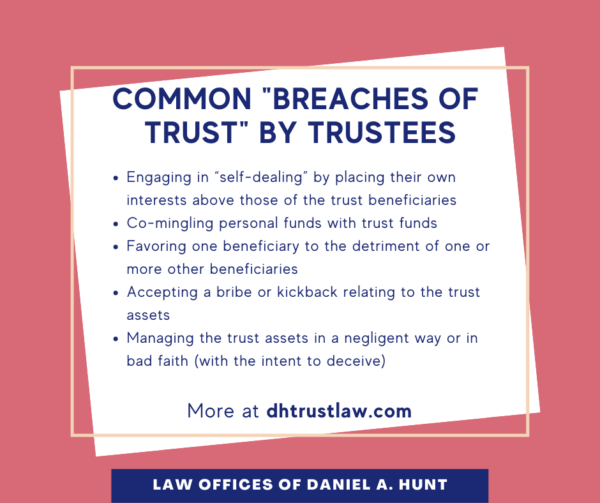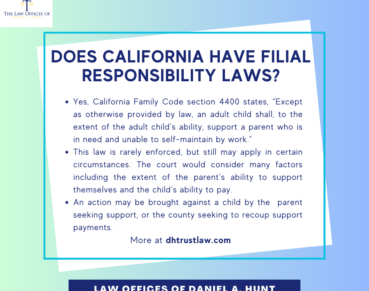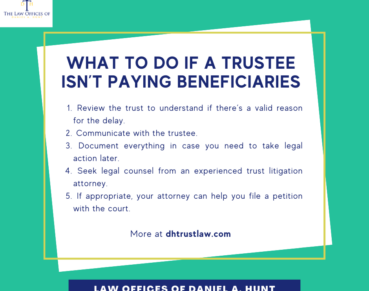What is a “Breach of Trust”?

If you’re a trust beneficiary who suspects the trustee of wrongdoing, you may wonder: What is a “breach of trust”? A breach of trust occurs when the trustee fails to observe their fiduciary duties under the California Probate Code or to carry out the terms of the trust instrument. If you feel the trustee has committed a breach of trust, you need to understand how to recognize a breach of trust and what you can do about it.
What is a Breach of Trust?
When a trustee engages in conduct that harms trust assets or beneficiaries, whether intentionally or through negligence, this is considered a breach of trust. Trustees have a broad range of legal duties under the California Probate Code. Any failure to observe their fiduciary duties exposes them to a lawsuit by the trust beneficiaries.
Common Examples
Here are some common examples of how a trustee may commit a breach of trust:
- Engaging in “self-dealing” by placing their own interests above those of the trust beneficiaries
- Co-mingling personal funds with trust funds
- Favoring one beneficiary to the detriment of one or more other beneficiaries
- Accepting a bribe or kickback relating to the trust assets
- Managing the trust assets in a negligent way or in bad faith (with the intent to deceive)
Statute of Limitations
Let’s say you suspect that one of the above activities has occurred. How long do you as a beneficiary have to sue the trustee? Under California Probate Code section 16460, a beneficiary has three years from the time they first knew (or should have known) about the breach of trust to sue the trustee.
Be aware that this deadline may be shortened to 180 days if the trustee provides an accounting that sets forth this deadline.
Penalties for Breach of Trust
If a breach of trust has occurred, what can the beneficiaries ask the court to do in order to remedy the harm done? If you sue the trustee and the case prevails in court, most judges will take one or more of the following actions:
- Removal/Replacement of Trustee: The judge may remove the trustee from their position or replace them with someone else.
- Surcharge: The court may order a reduction in the amount of the trustee’s fee or their share of the inheritance if they’re also a beneficiary. This surcharge reflects the amount the court determines that the trustee lost or mismanaged.
- Money Judgment: When there is no way to recover the actual assets or funds from the trustee’s fee or inheritance, the court may issue a judgment against the trustee. The trustee must then compensate the trust out of their own personal assets.
Taking the First Step
If you suspect that a trustee has committed a breach of trust, you should immediately seek legal advice from an experienced trust litigation attorney. They can help you analyze the facts, tell you if you have a case and how strong your case is, and lead you through the complex process of a litigated legal matter.
If you have any questions about a breach of trust, feel free to contact our office.
Law Offices of Daniel A. Hunt
The Law Offices of Daniel A. Hunt is a California law firm specializing in Estate Planning; Trust Administration & Litigation; Probate; and Conservatorships. We've helped over 10,000 clients find peace of mind. We serve clients throughout the greater Sacramento region and the state of California.




